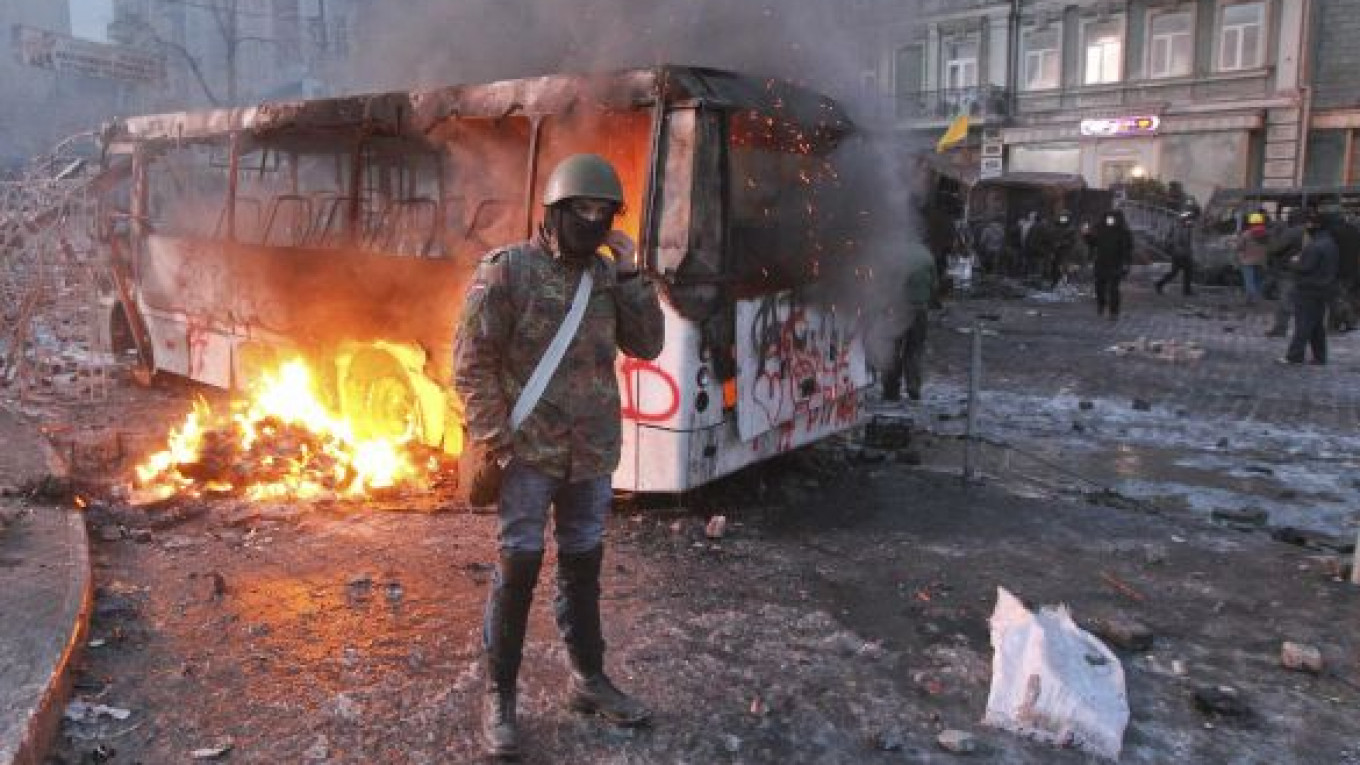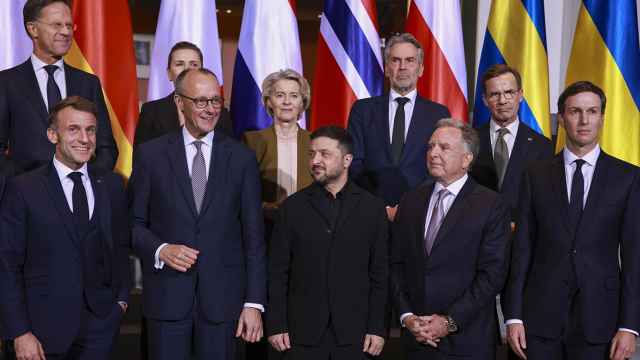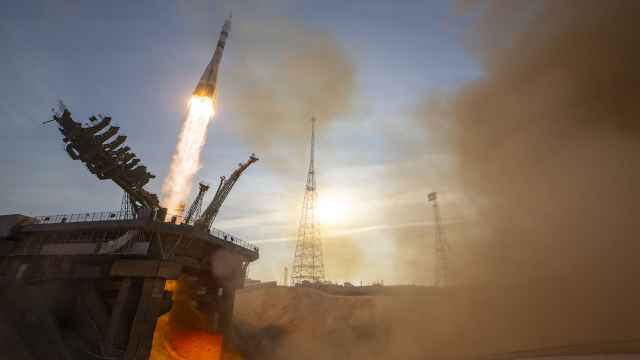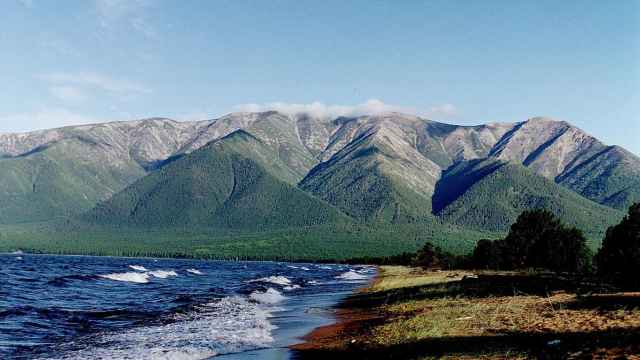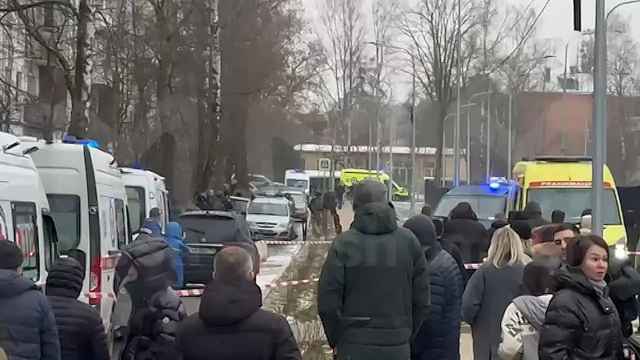BRUSSELS — The European Union is urging Ukraine to scrap new laws that are viewed as curtailing fundamental rights such as freedom of expression and the holding of peaceful protests.
The 28-nation bloc's foreign ministers said Monday that the laws rammed through Ukraine's Parliament last week under "doubtful procedural circumstances" must be scrapped.
Ukraine has been shaken since November by massive public protests after Russia lured the country's leaders with financial incentives to ditch closer cooperation with the EU.
The laws are widely seen as an attempt to silence the protests — but new rallies over the weekend drew tens of thousands of people and turned violent.
The EU statement calls on all parties to "exercise restraint," urging authorities "to fully respect and protect the peaceful demonstrators' right to assembly and speech."
After a night of vicious streets battles, anti-government protesters and police clashed anew Monday in Kiev. Hundreds of protesters, many wearing balaclavas, hurled rocks and stun grenades and police responded with tear gas.
Sunday's violence came after President Viktor Yanukovych pushed through the sweeping anti-protest law, which significantly increased fines and imposed jail terms for unauthorized street protests. The new law also prohibits activists from wearing helmets or masks to demonstrations, curbs free speech and limits the ability to investigate or monitor the activity of officials, including judges. The law also restricts the activity of nongovernmental organizations funded by the West, as many are in Ukraine.
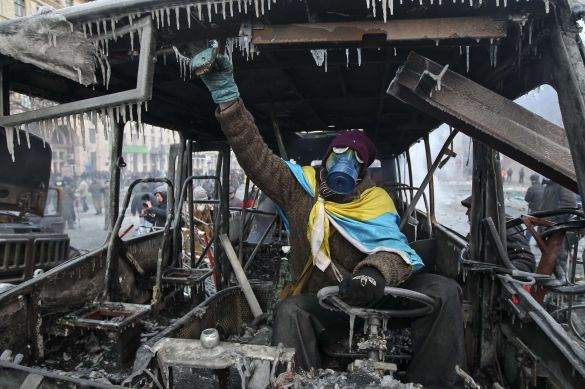
A pro-European integration protester sitting in a burned out police bus.
The law mirrors anti-opposition legislation passed in Russia, prompting accusations that Yanukovych is following in President Vladimir Putin's footsteps in building a police state. The U.S. has called the legislation "undemocratic."
The law has highlighted Yanukovych's disregard for the protests, which have been calling for his ouster, the restoration of civil rights and a pro-Western course for Ukraine. Yet demonstrators have been frustrated as well with the fragmented and often indecisive opposition.
During a large peaceful protest Sunday, the crowd chanted "Leader!" asking for the selection of one single protest leader who would take charge. When that did not happen, hundreds broke off from the main rally and marched toward parliament, where they began attacking riot police with sticks, firebombs and stones. Police responded with tear gas, water cannons and plastic bullets.
Opposition leader Vitali Klitschko, the world heavyweight boxing champion, tried to stop the violence, but was attacked by the radical protesters.
"We are tired of waiting, we must push the changes ourselves, we must change the leaders," said Petro Sopotensky, a 28-year-old protester.
Intent on preventing what he called a possible civil war, Klitschko went to Yanukovych's home Sunday night and emerged with a promise of negotiations. But the president appointed the embattled national security council head Andriy Klyuyev, whom the opposition blames for the violent dispersal of the student rally, to lead the talks. On Monday, Klitschko insisted that the president must personally take part. He also called on all Ukrainians to rush to Kiev to defend the country's future.
"Get into cars, shuttle buses, buses," he said in a video address. "You are needed here so that Ukraine is the winner, not Yanukovych."
Opposition leaders have been urging the EU and the U.S. to impose sanctions on top Ukrainian officials and Yanukovych's financial backers, but so far Western diplomats have only threatened sanctions and issued harsh statements. Hundreds of activists rallied outside the EU office in Kiev on Monday, chanting "We need your help!" in English and holding posters that read "No sanctions, no peace."
"The reaction of the international community has been inadequate," said Valeriy Chalyi, head of the Razumkov Center think tank. "We are talking about Ukraine's independence. And if one does not understand this today, tomorrow it will be too late."
The pro-Western protests in Kiev began Nov. 21 after Yanukovych shelved a long-planned political and economic treaty with the EU and then accepted a huge bailout package from Putin instead. The protests swelled to hundreds of thousands — the biggest since Ukraine's 2004 pro-democracy Orange Revolution — after riot police violently broke up a small peaceful student protest. Clashes broke out on Dec. 1 between radical protesters and police, but demonstrations since then have been peaceful.
A Message from The Moscow Times:
Dear readers,
We are facing unprecedented challenges. Russia's Prosecutor General's Office has designated The Moscow Times as an "undesirable" organization, criminalizing our work and putting our staff at risk of prosecution. This follows our earlier unjust labeling as a "foreign agent."
These actions are direct attempts to silence independent journalism in Russia. The authorities claim our work "discredits the decisions of the Russian leadership." We see things differently: we strive to provide accurate, unbiased reporting on Russia.
We, the journalists of The Moscow Times, refuse to be silenced. But to continue our work, we need your help.
Your support, no matter how small, makes a world of difference. If you can, please support us monthly starting from just $2. It's quick to set up, and every contribution makes a significant impact.
By supporting The Moscow Times, you're defending open, independent journalism in the face of repression. Thank you for standing with us.
Remind me later.


